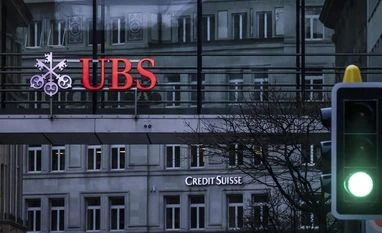UBS has identified at least four countries, including South Korea and India, as being "slow" to grant the regulatory approvals needed to complete its takeover of Credit Suisse, an internal document reviewed by Reuters shows.
The Swiss banking giant has also highlighted Ireland and Saudi Arabia as "slow jurisdictions" in granting licences, according to the previously unreported document which was dated Sept. 6 and was circulated to UBS staff globally.
Prepared by UBS after a global review to assess the timeline of regulatory approvals necessary for the integration of Credit Suisse to complete, the document said uncooperative regulators could put transactions such as the Swiss bank deal at risk.
The document says that "a single non-cooperative regulator can jeopardize the timeline of the parent bank merger and other transactions", impacting other related integration deals.
The uncertainties could lead to winding down businesses and asset sales, when UBS faces "difficult jurisdictions or regulators", the Swiss bank said in the document.
Credit Suisse, which was Switzerland's second-biggest bank, suffered years of scandals and losses before it had to be rescued in March in a state-engineered takeover by UBS.
Also Read
Although UBS completed the takeover in June, it still needs approvals from regulators in markets where both the banks operate for the legal completion of the first rescue of a global bank since the 2008 financial crisis.
Credit Suisse declined to comment. UBS did not respond to a request for comment. Spokespeople for central banks in South Korea, India, Ireland, and Saudi Arabia also did not immediately respond to Reuters requests for comment.
It is normal for large merger and acquisition deals to be delayed by the myriad regulatory approvals needed to close a deal, and in very few cases transactions do get derailed due to objections raised by some regulators.
The first-ever merger of two global systemically important banks has created both opportunities and risks for UBS, which has been working on integrating Credit Suisse's businesses.
Last month UBS said it expected the takeover to be completed in 2024. The bank's internal document showed the process could be finished as soon as May next year.
'CHANGE IN CONTROL'
In South Korea, it may take up to 18 to 22 months to obtain new licences, while in Ireland the process could take up to two years, and in Saudi Arabia up to 12 months, the document said.
The regulator in India could take a minimum of six months to approve the setting up of a new branch, it added.
UBS also said in the document that for Russia, a "change in control" approval may never be obtained as this could be a politically driven decision.
In a May disclosure filed with the U.S. securities regulator, UBS said that its exposure to Russia contributed $98 million to its total emerging market exposure of $18.6 billion as of Dec. 31, 2022.
Last month, a Moscow court banned UBS and Credit Suisse from disposing of shares in their Russian subsidiaries, Reuters reported, citing court documents.
Laws introduced after Russia despatched troops to Ukraine in February last year have made presidential approval necessary for banks to cut ties with their local business, while a government commission reviews all asset transfers involving Western firms.
Russia's central bank and finance ministry did not immediately respond to requests for comment.
The majority of markets UBS and Credit Suisse operate in grant automatic transfer of all assets and liabilities, which they term universal succession, while seven of 51 jurisdictions do not recognise the practice, the document showed.
Those seven markets are Bahrain, Dubai, Abu Dhabi, Japan, Saudi Arabia, Thailand, Turkey, said the document, adding that "individual transfers are very burdensome, time-intensive and entail the risk of missing consents" in those jurisdictions.
(Reporting by Engen Tham in Shanghai and Selena Li in Hong Kong; Additional reporting by Jihoon Lee in South Korea and Alexander Marrow in London; Editing by Sumeet Chatterjee, Stephen Coates and Alexander Smith)
(Only the headline and picture of this report may have been reworked by the Business Standard staff; the rest of the content is auto-generated from a syndicated feed.)
)